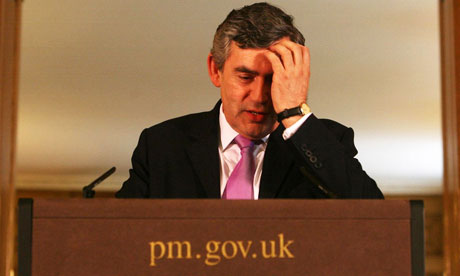imagine, he lost thousands of votes because of his involvement in covering up the death of this child.
WikiLeaks cables: Gordon Brown an 'abysmal' prime minister
US wrote off Brown after first year as PM and blamed him for 'post-Blair rudderlessness' which had Labour figures in despair

The US embassy in London wrote off Gordon Brown within a year of his arrival in No 10 after concluding that an "abysmal track record" had left him lurching from "political disaster to disaster", according to cables released by WikiLeaks.
In a scathing assessment of the former prime minister, George Bush's last ambassador to London blamed Brown for presiding over a "post-Blair rudderlessness" which prompted senior Labour figures to complain of their despair to the embassy.
The diplomatic cables confirm that Barack Obama's allies were irritated by Brown's intense manner: he interrupted a Thanksgiving call to the current president's ambassador to lobby for a Tobin tax on financial transactions in the face of US opposition. "Prime minister Brown continues to press hard … despite being fully aware of US opposition to the tax," Louis Susman wrote in December last year.
US diplomats monitored the troubled premiership in detail and told Washington about the rules for replacing a Labour leader and Brown's likely successors.
The embassy fired off a flurry of cables at the end of July 2008 after Labour's "terrible" byelection defeat to the Scottish National party in Glasgow East. This prompted David Miliband's controversial Guardian article on the future for Labour which failed to mention Brown.
Robert Tuttle, Bush's last ambassador to London, wrote in a cable on 31 July 2008, a week after the byelection: "As Gordon Brown lurches from political disaster to disaster, Westminster is abuzz with speculation about whether he will be replaced as prime minister and Labour party leader, and, if so, by whom … A terrible byelection defeat … has left the Labour party reeling and fuelled fears among MPs that Brown's leadership of the party, and his premiership, may now be beyond repair."
The ambassador wrote pen portraits of several Labour figures who might succeed Brown. They included David Miliband but not his brother Ed, who is now party leader. Tuttle concluded: "We don't see a clear tipping point on the horizon – but given Brown's abysmal track record over the last year, that day could come when Labour MPs return from vacations in late August/early September."
In a sign of nerves in the Brown circle about the damage to his international reputation, one of his chief lieutenants briefed the US embassy the morning after the byelection defeat. Nick Brown, the then deputy chief whip, admitted the defeat had been a "terrible" blow but insisted his namesake would see off his Labour opponents. "Nick Brown said the prime minister and his allies would be able 'to slap down'" any threat, political counsellor Rick Mills wrote.
The embassy's view of Brown improved in the autumn of 2008 when he led the way in recapitalising banks after the collapse of Lehman Brothers. In a cable on 15 October 2008, the acting minister counsellor Kathleen Doherty wrote: "After a year of plummeting poll numbers and questions about his ability to lead, Gordon Brown is suddenly riding high."
Within months, however, the embassy described Labour as a "sinking ship". In a cable on 24 April 2009, after Damian McBride had resigned over his involvement in a plot to smear Tories, the political counsellor Greg Berry said Labour was in such a poor state that none of Brown's possible challengers would want to strike.
"We assess it unlikely that any Labour politician with his or her eye on the future would want to take on the sinking ship that is the current Labour party at this time of crisis," Berry wrote. "It is more likely that Labour will go down in the next election – and then will begin the process of rebuilding."
Later, on 6 May 2009, Berry reported that Brown had suffered a "wretched two weeks" after McBride's resignation and losing his first vote in the Commons. "A wounded, but still standing, Gordon Brown remains at the helm of his party and is likely to do so until the voters speak in the next election, increasingly likely now to be postponed until the latest date possible next spring
… The man who has nursed his dream – and grievance – of being prime minister since 1994 is not going to walk out of Downing Street now."
The embassy had signalled its doubts about Brown early in his premiership. In a gloomy account of Brown's first spring conference as prime minister, Tuttle cabled that his first speech elicited little more than polite applause.
"The Labour party spring conference … was characterised by low energy, poor attendance, and a lack of charismatic leadership. The lack of energy that hung like a pall over the keynote speech was evident elsewhere, either because of low attendance or the party's financial woes."
Tuttle concluded that the party was lacking the skills of Tony Blair. "For a party that still contains a large element who feel more comfortable in opposition ... self-questioning contributes to a feeling of post-Blair rudderlessness. Even though Blair ended up unpopular, he was the sun around which the party orbited, and his speeches, no matter the content, sparked an emotional response. Brown's earnest and praiseworthy vision excites no opposition and yet it seems to excite no great enthusiasm either."
The ambassador noted potential at the conference. "David Miliband provided rare moments of star power for a party that seems increasingly to miss Tony Blair's charisma. In an otherwise low-key conference, the frisson of excitement whenever the foreign secretary, David Miliband, appeared was palpable."
As Labour headed towards the general election, the embassy was still critical. A cable said Brown's last Queen's speech "missed the mark with a mixed bag of populist proposals that there was little time to pass".
